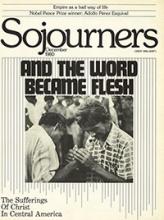In a Guatemalan parish, four men were seized and hung up on a wall of the church. Their captors added to their writhing pain jeering words of torment: "Antonio, do you want some water? Do you want a tortilla?"
Three of the four men died.
In the tragic irony of this scene, we see Christ in his last moments. A spectator at the foot of the cross, in a mocking effort to prolong his agony, places a sponge soaked in vinegar on the end of a reed and lifts it to the thirsty Christ.
This season we celebrate the incarnation. But we cannot gaze long at the humble birth without being propelled to the event of the cross. The poor are still being crucified.
Central America is a land in shock. Each day the death tolls lie buried in the double-digit pages of our northern newspapers: a priest murdered last week, 30 peasants massacred yesterday, an entire village machine-gunned today.
The statistics rolled off my mind for months. Then one day I stopped and pictured the four men hanging on a church wall; the eight-year-old boy who saved his life during a military raid on his village by covering himself with the corpses of his family and friends; the 60-year-old woman who died an hour after a violent rape; and the Salvadoran mother sobbing at a mass grave as she picked through skulls and hoped not to find her disappeared son's: "This one cannot be him--he had a gold filling in that tooth."
The people of Central America are walking through a river of grief that empties into an ocean of martyrs. There are the famous ones, like Archbishop Oscar Romero of El Salvador (see May, 1980, Sojourners), as well as the hundreds of Indians massacred in Guatemala, known as the "anonymous martyrs." There have been so many that Roque Dalton Garcia, a Salvadoran poet, wrote the following:
Read the Full Article

